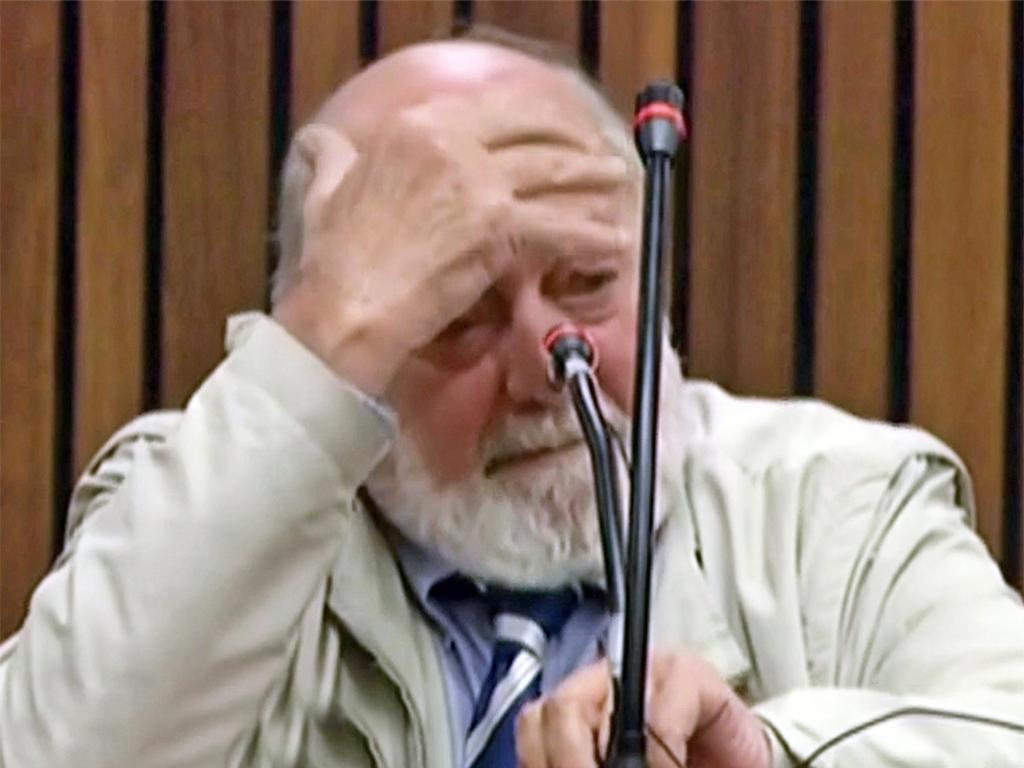Oscar Pistorius walks without prosthetic legs during sentencing as defence lawyer appeals for leniency
'Not a day goes by without thinking about her,' Ms Steenkamp's cousin told a court

Your support helps us to tell the story
From reproductive rights to climate change to Big Tech, The Independent is on the ground when the story is developing. Whether it's investigating the financials of Elon Musk's pro-Trump PAC or producing our latest documentary, 'The A Word', which shines a light on the American women fighting for reproductive rights, we know how important it is to parse out the facts from the messaging.
At such a critical moment in US history, we need reporters on the ground. Your donation allows us to keep sending journalists to speak to both sides of the story.
The Independent is trusted by Americans across the entire political spectrum. And unlike many other quality news outlets, we choose not to lock Americans out of our reporting and analysis with paywalls. We believe quality journalism should be available to everyone, paid for by those who can afford it.
Your support makes all the difference.Oscar Pistorius has walked around a courtroom without his prosthetic legs as his lawyer appealed for a lenient sentence for the killing of Reeva Steenkamp.
Judge Thokozile Masipa has the power to reduce South Africa’s minimum 15-year prison term for murder after listening to evidence from the prosecution and defence.
As he continued appeals for mitigation, Pistorius’ lawyer called the former Paralympian to the stand and asked him to walk without his prosthetic legs.
Barry Roux said he wanted to give the court “an idea” of his defendant’s experience on the night he shot his girlfriend dead, adding: “He’s very embarrassed but he understands it’s important.”
The lawyer said his client suffers from an anxiety disorder, adding: “His balance was severely compromised and without (a weapon), he would not be able to defend himself…this must all be seen in the context of his disability."

Pistorius appeared to be crying in silence as he remained standing while his lawyer described the killing.
Mr Roux went on to claim Ms Steenkamp’s death had “nothing to do with gender violence” and said the public nature of the trial had ruined the disgraced athlete’s life.
Speaking during Pistorius’ sentencing hearing at the North Gauteng High Court, Barry Roux claimed the live broadcast of hearing had driven a “media frenzy”.
“This trial by public opinion will continue to haunt the accused long after the conclusion of the criminal process,” he said, saying his client had been the victim of a “character assassination”.
Mr Roux argued Pistorius had no intent to kill his girlfriend Reeva Steenkamp and believed she was an intruder when he shot her through a door on Valentine’s Day 2013.
“Despite the fact that the finding remains that the accused did not want to kill the deceased…the accused’s case is still portrayed in the public domain as an example of gender-based violence,” the defence lawyer said.
“That hurts him because he was a person opposed to gender violence…this man in his mind has no gender violence…it’s not the consequence, it’s the intent.
“This case has nothing to do with gender violence but the penny doesn’t drop, because some people don’t want the penny to drop.”
Pistorius sat with his head in his hands as the hearing continued on Wednesday, watched by members of Ms Steenkamp’s family.
Mr Roux said the defendant had faced public abuse and harassment after becoming the “face of gender violence” in South Africa.
“As a result of this sustained campaign of misinformation, the accused’s reputation will never recover,” he added.
Ms Steenkamp’s cousin has described her father as a “broken man” as she described the harrowing impact of her death on the family earlier in the hearing.
Kim Martin was the last state witness to give evidence on the third day of his sentencing for murdering is girlfriend.
“Not a day goes by without thinking about her,” she said. “As a family we will never be able to carry on like normal.

“I’m coping, yes, because you’ve got to get on with your life but the scars, the effect runs very deep.
“I’m the mother of three children, so I have to cope…I have to be strong for them.”
Ms Martin told the court in South Africa that birthdays, Christmas and other celebrations had become a “funeral” since Ms Steenkamp’s death.
“Valentine’s Day is the worst day for us,” she added. “I saw my father cry for the very first time when Reeva died...Barry (Ms Steenkamp’s) father is a broken man."
Giving evidence yesterday, he said his daughter’s murder had “devastated” his family.
In a voice shaking with emotion, Barry Steenkamp revealed he has tried to imagine the horrific moment of his daughter's death, and said: “Oscar has to pay for what he did.”
Charlotte Mashaban, a prison nurse, told the court Pistorius could be violent, having “tantrums” and becoming angry during her time treating him.
His lawyer, Mr Roux, contested the claim and accused her of embellishing her account of the incidents.
Pistorius, a former Paralympic champion, has been convicted of murdering his girlfriend at his home on Valentine’s Day in 2013 in a case that transfixed the world.
The double-amputee, who also competed at the 2012 London Olympics, is currently under house arrest after initially serving one year of a five-year prison sentence for manslaughter for shooting Ms Steenkamp at his Pretoria home.
That conviction was overturned last year by an appeals court, which convicted Pistorius of the more serious charge of murder.
Judge Thokozile Masipa, who initially acquitted Pistorius of murder, will decide the new sentence in a hearing scheduled to run until Friday.
Pistorius shot Ms Steenkamp, a model and reality television star, several times through a toilet door.
He claimed in his trial that he thought his house had been broken into, and that he opened fire in the belief that an intruder was hiding in the small room.
Ms Martin told the court the family wanted to know “the truth” and for Pistorius to apologised for the killing.
South Africa has a minimum sentence of 15 years in prison for murder, although it can be reduced by a judge.